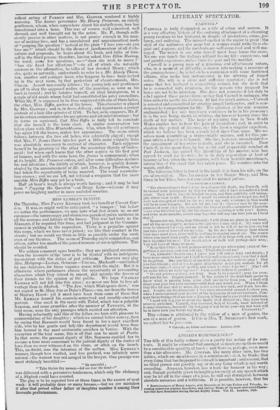MISS KEMBLE'S BENEFIT.
ON Thursday, Miss FANNY KEMELE took her benefit at Covent Gar- den. It was, as might well be anticipated, "a bumper ;" but before we notice the performance, we may note what first struck us on our entrance—the unnecessary and obnoxious parade of police uniforms in all the avenues and lobbies of the house. This was bad taste hi the Manager, if he required this force, and bad judgment in the Commis- sioners in yielding to the requisition. There is a prejudice against this corps, which we have never joined ; we like their conduct in the streets ; but we would see them as little as possible under the roofs even of our theatres. The scene of Thursday night reminded us, and others, rather too much of the gens-d'armerie of' our neighbours. This should be avoided.
We seldom comment upon benefits : they are privileged occasions, when the Favourite of the hour is to be treated with an indulgence inconsistent with the duties, of just criticism. DOWTON may play Mrs. Malaprop—LiSTON, Octavian—YouNG, Macheath —unchecked by our strictures, for these vagaries cease with the night. But it is otherwise where performers choose the opportunity of personating characters which they intend to repeat, and mistake the Favour of their friends for the opinion of the public. We hope CHARLES KEMBLE will not fall into this error ; ,we never saw him to less ad- vantage than in Shegock. "The Jew, which Shakspeare drew," was not copied in St. Mary Axe or Duke's Place,—no, nor from the heroes of Moulsey Hurst: yet it must have been from some of these that Mr. KEMBLE formed his coarsely-conceived and roughly-executed portrait. One snarl in the scene with Tubal, which was a palpable Keanism, and some grumbles after the manner of FAWCETT, in the trial scene, were the only passages which excited our attention. Having reluctantly said this of the father, we turn with pleasure to commendation of his daughter ; which we cannot better convey, than by saying that Bassanio would have found in her a most excellent wife, who by her gentle and lady-like deportment would have done him honour in the most aristocratic societies in Venice. With the exception of the trial scene, this is all that can be made of Portia. In that scene, the personal dignity of Mrs. SIDDON3 enabled her to assume a tone more consonant to the judicial dignity of the doctor of laws than we ever witnessed on the stage, or often on the bench. This, no doubt, was the intention of the author. Miss KEMBLE'S manner, though less exalted, and less poetical, was infinitely more natural—the woman was not merged in the lawyer. One passage was most strikingly beautiful:— "Be merciful,. "Take thrice thy money—bid me tear the bond—" was delivered with a persuasive tenderness, which only the obduracy of a Shylock could have resisted.
The play is to be repeated two or three times in the course of next week: it will probably draw so many houses,—but we are mistaken if after that period either father or daughter number it among their favourite performances.


















 Previous page
Previous page